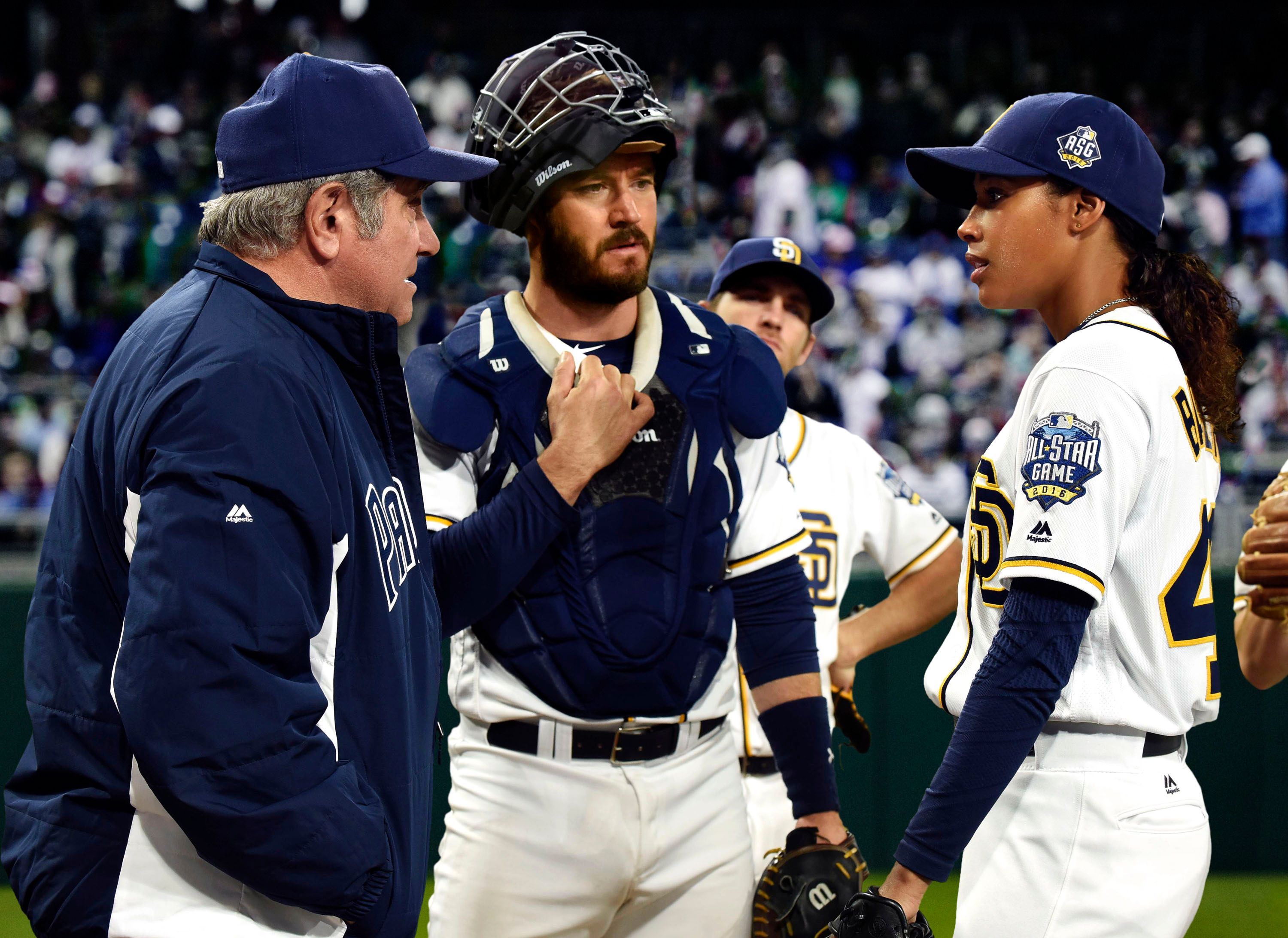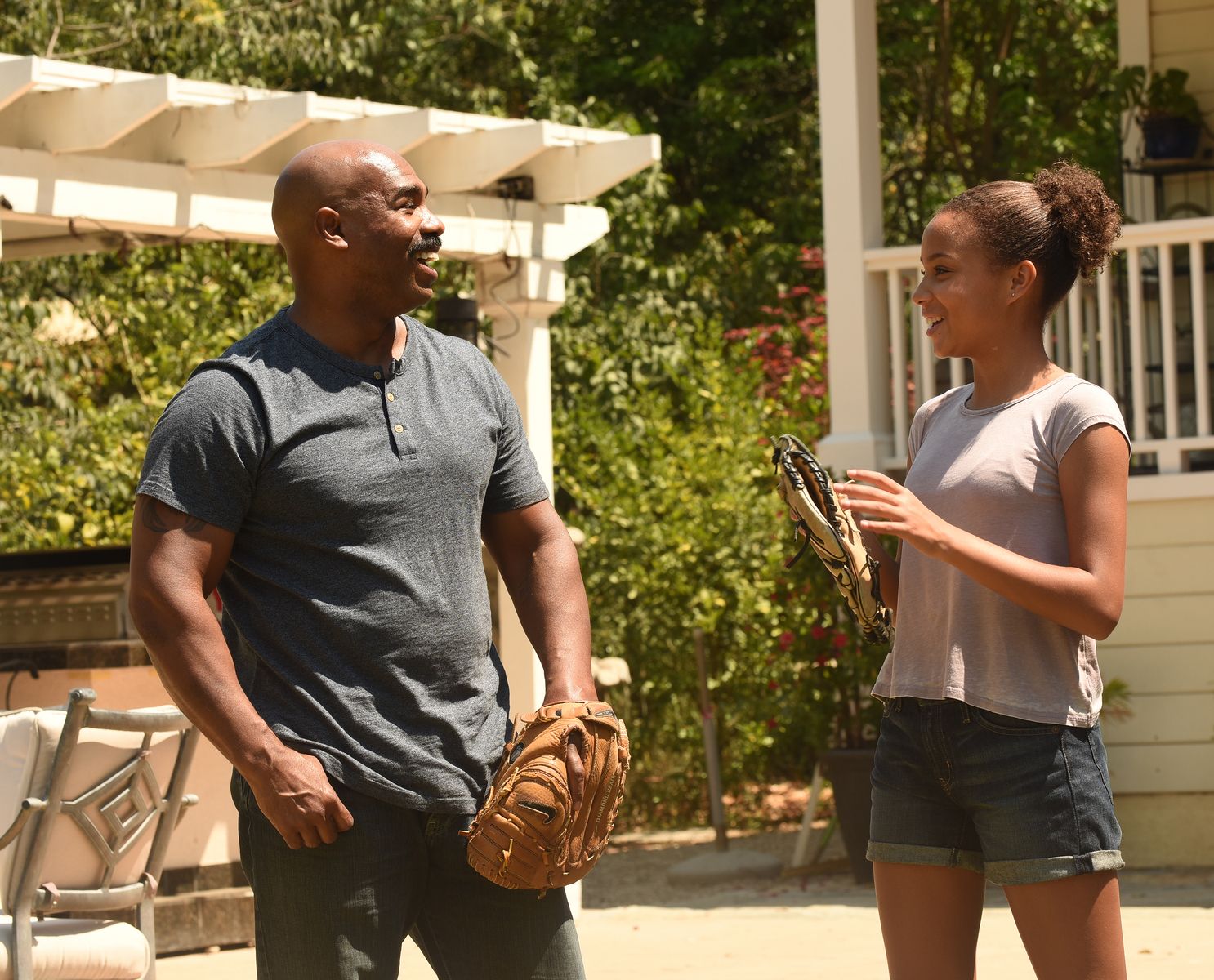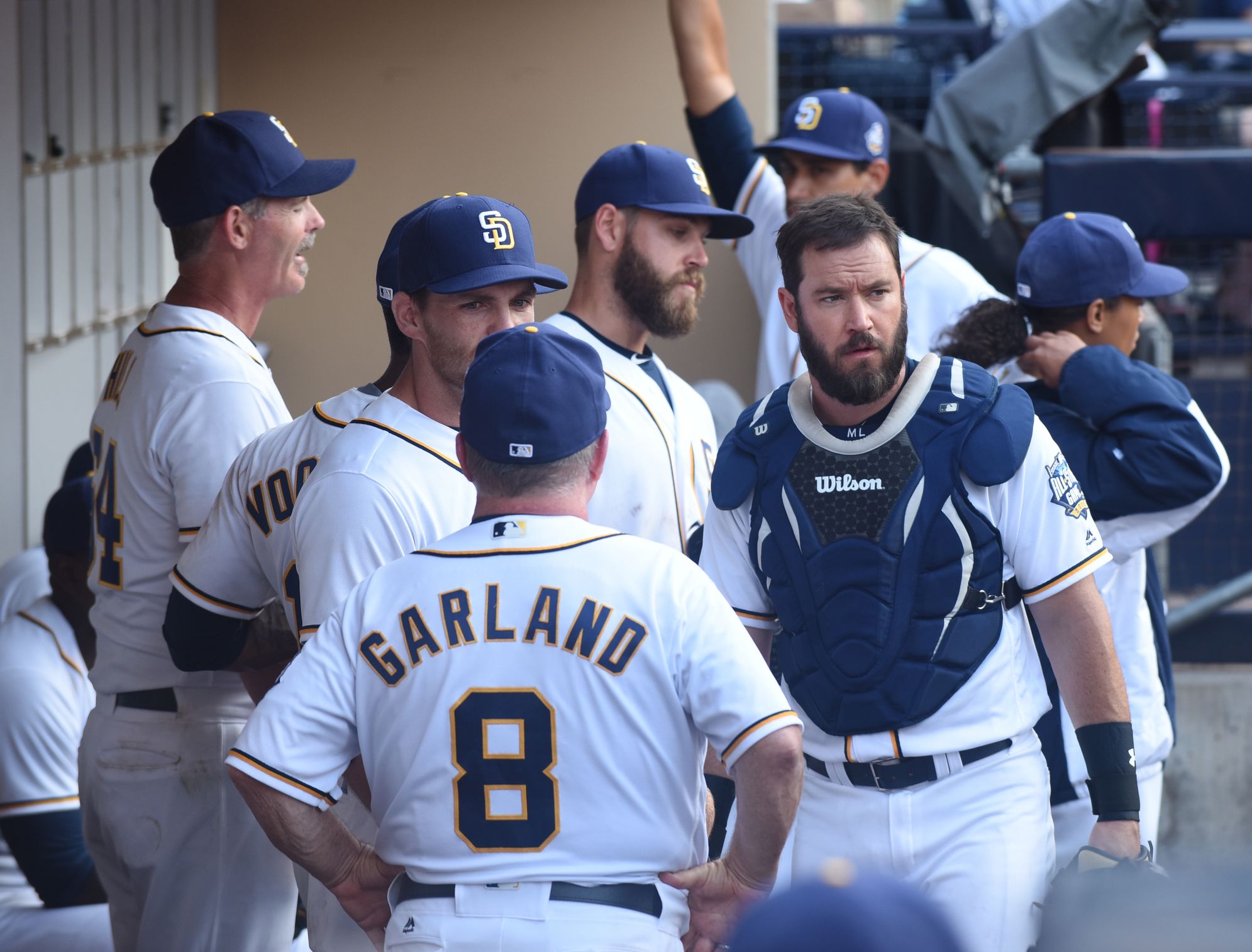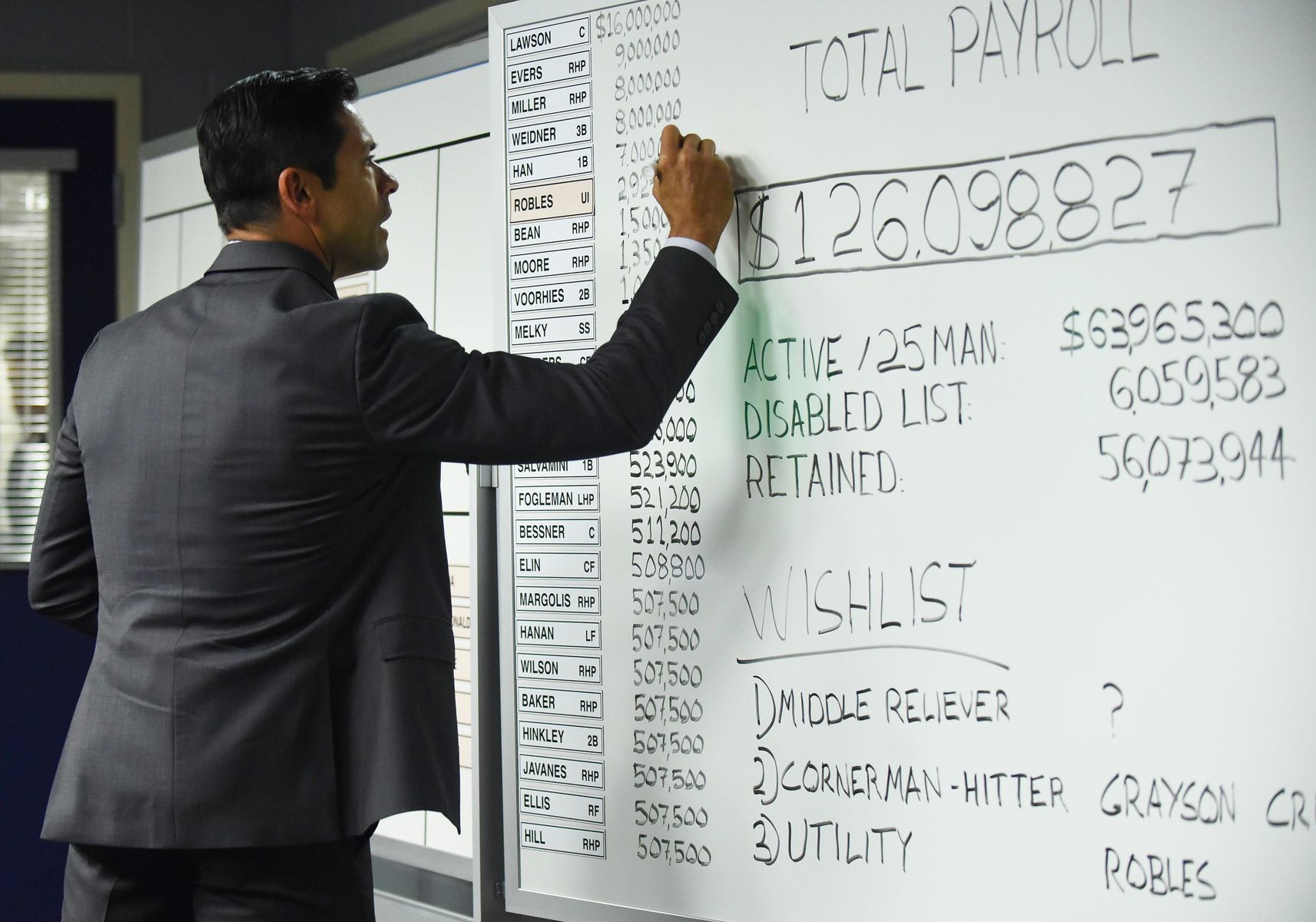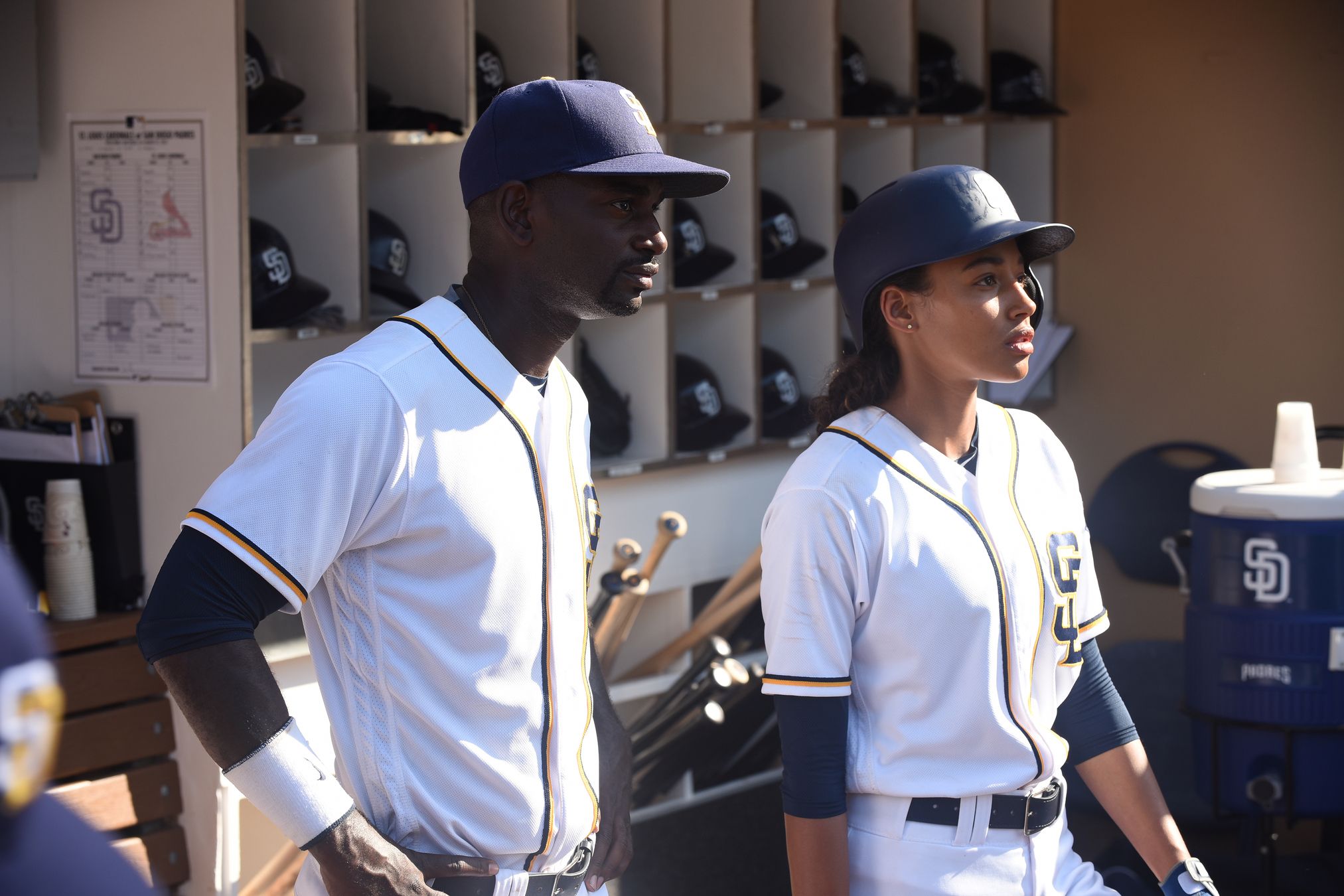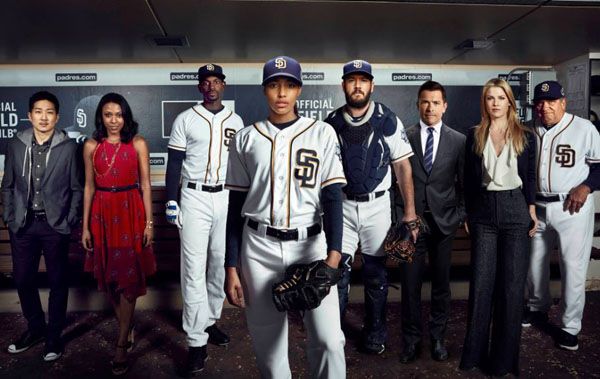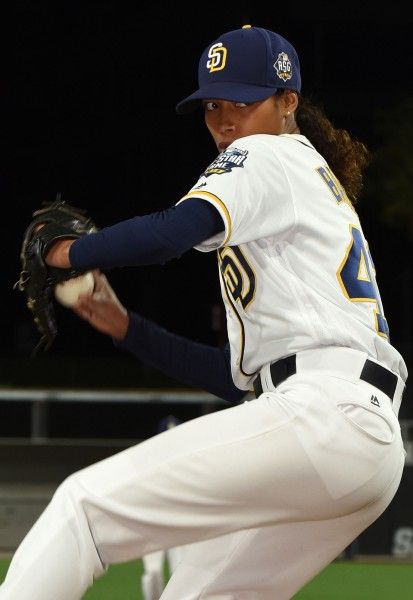In every crowded fall season, viewers are bombarded with a slew of new programming that all starts to look and sound the same. There are only a few that jump out as potentially promising, but Fox's baseball drama Pitch was an early contender when its promos first started airing. Its premise is one America has only grappled with on the fringes of professional sports: what if women joined the men? There have been some, in fairly recent history (Danica Patrick in NASCAR and Michelle Wie in the PGA), but the idea of a woman joining something like the MLB has long seemed more like a punchline than a reality.
But Pitch addresses this idea head-on, not by making its protagonist Ginny (Kylie Bunbury) as fast or as strong as the men, but acknowledging that what makes her able to compete is that she has a unique pitching style. Many of the early storylines deal with the realities of Ginny's role as an inspiration while also needing to step aside for pinch hitters, and finding that she can't always use her patented screwball because other teams have figured out how to defend against it. But the very fact that Fox's drama addresses these issues in a real way -- instead of just focusing on bias and bed hopping -- is unique unto itself.
Pitch has subverted expectations in so many ways, and I'm not sure that audiences have known what to make of it. Though the World Series has been giving Fox great ratings, Pitch (which should have a very inclusive audience appeal -- you don't have to love baseball to love the show) has lagged. Below, Kayti Burt and I have listed our top reasons why you should give the series a chance, if you haven't already. It deserves your attention (Thursday nights on Fox!) Here's why:
The Game Actually Gets Played
This is kind of a big one. There are plenty of TV shows that are about athletes or sports teams, but most shy away from showing us any actual scenes of the game in play. It's not a big surprise -- these are actors, not athletes, and there's too much that can go wrong (and look wrong), while the scenes end up being expensive set pieces. Plus, there's the issue of using real team names that might lessen the immersion into this fictional world.
But the good thing about baseball (rather than say, the NFL) is that you can focus in on certain aspects of the game pretty narrowly on film and still give viewers a sense of seeing something real. Further, the pitcher/catcher relationship being the focus means that a few quick edits of people at bat will take care of most of what you need to see happening. Bunbury has also discussed how she learned the correct way to stand, pitch, and hit that would make her moments on the mound and at the plate more believable. (And, Pitch did decide to have Ginny play for a real team: the San Diego Padres).
All of that is to say that Pitch has distinguished itself, so far, in that it has no interest in just staying in the locker room or on the team bus -- it wants us to see Ginny play. -- AK
Mark-Paul Gosselaar Is Fantastic
You wouldn't be faulted for not recognizing Mark-Paul Gosselaar in his role on Pitch, where he has truly transformed himself into a beefy ballplayer. Gosselaar owns his role of catcher Mike Lawson -- beloved by fans and a leader on the team and in the league -- making him likable and relatable while also being tired and arrogant (and occasionally awkward and vulnerable). Mike could easily be a caricature of an aging player who has seen it all and makes no apologies for his behavior, but instead, his character starts off as the series' strongest personalities, and only becomes more layered from there.
In another thoughtful turn, though Mike could have been created as a love interest for Ginny (they have chemistry), but their relationship has smartly taken the form of mentorship and friendship. Mike instead has become a romantic foil for Ginny's tough agent, Amelia (Ali Larter) which is a better pairing with more dramatic potential. -- AK
It Uses Flashbacks Effectively
Since Lost hit network TV in 2004, the flashback has been an unnecessary tack-on to many a TV show structure. In an effort to capture the same kind of success as the ABC science fiction show, The Powers That Be take a superficial and/or highly contextual elements like The Flashback and add it to their new TV shows. Unnecessary flashbacks ensue. (Sorry-not-sorry, Arrow after Season 2.)
So far, Pitch is not guilty of unnecessary flashbacks. Rather, the show effectively flashes back to various points in Ginny’s life to highlight whatever struggle she’s going through in present-day. It doesn’t hurt that the show has managed to throw some surprising twists into the flashbacks. Rather than using flashbacks as a gimmick, Pitch uses them to slowly unveil the larger narrative of Ginny’s life, highlighting all she has been through to get to where she is today. It’s also a particularly useful device for a character who is so internal. Pitch’s flashbacks work to inform our perspective on who this young woman is, even if it is in Ginny’s nature not to tell us. -- KB
It's About the Team
The show could -- and does, admittedly, to a large extent -- focus primarily on Ginny and her experience in being the first female athlete in professional baseball. There are plenty of storylines about locker room problems, gender bias, and more, but Pitch has also been slowly expanding its world to include the rest of the team. There's Mike Lawson, of course, but there's also Ginny's friend Blip (Mo McRae) and his wife, who give an alternate view of what it looks like to "make it," by showing the sacrifices Blip and his family have to make for his career.
Pitch also isn't interested in setting up simple villains on the team. There are players that it takes Ginny longer to bond with, but those moments are not just earned but also sometimes realistically ephemeral. Pitch also gives a surprising amount of time to issues in the Padres' front office, and how those changes affect the team as a whole. It makes narrative sense that Ginny will end up staying with the team for awhile, but roster changes also mean that there's an opportunity for a rotating cast that can keep storylines fresh.
Plus, the show does a great job understanding the role of the media, with plenty of cuts to fans, pundits, and cultural commentators who are part of Ginny's rise, and also an essential part of her impact on the Padres' finances. Speaking of which ... -- AK
It Gets the Business of Baseball
When I heard that the MLB would be giving unprecedented access for the making of Pitch, I was worried that the show would show an uncomplicated view of Major League Baseball. Thankfully, and impressively, this hasn’t been the case. I’m not saying Pitch is portraying the MLB in a negative light (nor should they), but it isn’t a glorification of the industry, either. It’s honest about the corporate machinations that go on behind the scenes and does a good job juggling the exploration of baseball as a passion and/or purpose vs. the exploration of baseball as a business.
This week's episode features a tense, brutal scene that demonstrates this tension particularly well. Ginny goes to Padres general manager Oscar (Mark Consuelos) to timidly demand that her friend Blip Sanders not be traded. Oscar is under a lot of pressure because of the looming trade deadline, the near-impossible demands of the interim president of operations, not to mention dealing with the pain from an abscessed tooth. He snaps at Ginny, explaining to her that this isn’t a kindergarten classroom, but rather a multi-billion dollar industry.
The scene is particularly riveting because Oscar is such a complex character. He isn’t painted as The Bad Guy, nor should he be. He grew up as a poor kid in Mexico City before playing baseball professionally and moving up the ranks of the Padres management. He isn’t wrong, but neither is Ginny, who is fighting for her own happiness and mental health as a professional baseball player. She is not only a financial asset for the Padres, but she has to deal with much more than the average professional baseball player as the first women in the league. Neither of them is totally wrong (though Oscar is probably right that Ginny’s ask is inappropriate), and Pitch doesn’t make us choose. -- KB
Its Diverse Cast of Characters
It sucks that this is a thing we need to highlight as a reason to watch a TV show. It would be great if we lived in a media era where diversity was everywhere, so we didn’t have to point it out like some sort of rare, endangered species. However, we do not live in this world. Therefore, we must celebrate and praise examples of diverse media where we can, and Pitch definitely fits the bill.
Pitch not only has a female character of color as its central protagonist, but it boasts a cast filled with examples of complex characters from various backgrounds. In the main cast, we have Ginny, Oscar, Blip, Tim, Rhonda, and scene-stealing Evelyn (Blip’s wife and one of Ginny’s only friends outside of the baseball world) as non-white characters who actually get to do things.
In addition to Pitch’s racial diversity, the show also addresses class in some ways, as so many of the characters come from modest to poor backgrounds and are now being paid a lot of money to play baseball. Pitch’s exploration of class is particularly prevalent in Oscar’s character and the flashbacks, which see moments like Ginny’s friendship with the new guy in town who can’t afford to go to college and play baseball, but isn’t good enough to get a scholarship like Ginny. We’ll have to wait and see if Pitch dives more into this exploration and intersections of race, class, and other complicated identity issues, but, for now, it’s one of the best places to go if you’re looking for a show with a diverse cast of characters. -- KB
It Reminds Us of Our Favorite Sorkinian Dramas
Yep, I just made up the word “Sorkinian” (although I doubt I’m the first), but you know exactly the dramatic vibe I’m talking about when I turn Aaron Sorkin, the creator of The West Wing, Sports Night, The Newsroom, and Studio 60 On the Sunset Strip into an adjective, don’t you? Well, Pitch has the speechifying, recurring bouts of idealism, and slightly-chaotic ensemble thing down. Pitch is definitely not a full-on Sorkin show, and its dialogue style in particular differs from the characteristic Sorkin fast-talking. But there are elements of Sorkin’s style in it, which is particularly nice given that we currently have zero actual Sorkin shows on the air.
Pitch in particular reminds me of Sports Night. Yes, there is the sports connection, with no doubt informs this parallel, but there’s also an earnest, raw eagerness to Sorkin’s first TV show in particular that Pitch seems to capture. As a female-centric sports ensemble with unprecedented access to the MLB, Pitch is aware that it is something new on TV and it is understandably excited about it in a way that Sports Night, a show that started with a laugh track before phasing it out, was also aware. Hopefully, Pitch lasts longer than the canceled-too-soon Sports Night. -- KB



